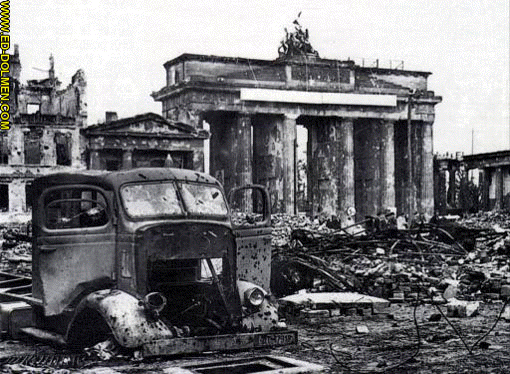
We make it without misfortune to Güntzelstrasse in Wilhelmsdorf, pick up some vital packages there, and then we try to make it to the apartment in Kielganstrasse, near Nollendorfplatz, and then, we hope, all the way to the Finnish bunker to save our clothes and other possessions, but we're too late. The main streets are barricaded, so the car must wind its way forward, taking the oddest detours. Grenades are falling constantly on Lützowplatz, it's mad to try to make it through --- we do an about face and head back to Dahlem.
The few cars we pass are all driving at the same breakneck speed, and the danger of collision has never been greater, but luck is with us and we reach Dahlem in good shape. No castaway could be happier to have reached a blessed green isle than we are when, a short while later, we are sitting in the freshly blossoming spring garden, which seems twice as peaceful and beautiful after all the thundering cannons in the gray city center. Meanwhile, a cozy evening meal is simmering in a pot on the hearth between green bushes.
Eggs, butter, and canned goods are nice to have, but we have access to a small supply of something even more important: bread. In Lichterfelde West, at the residence of one of the Royal Norwegian government's secret trustees in Berlin, there are packages from the Royal Norwegian Legation in Stockholm, which contain large amounts of crispbread, among many other good things. If there's a hope of getting some of it, the attempt must be made this afternoon, as quickly as possible. The thunder from the artillery is getting louder; more and more Russian planes are racing through the air. War is clearly approaching Dahlem.
The road to Lichterfelde West is not long, a half-hour by foot, but it's no walk in the park. I pay a short visit to my colleague Huitfeldt, from the Danish newspaper Socialdemokraten, to ask him to come along. It's better to travel with someone in such circumstances. On several occasions we have to press ourselves into a doorway, our hearts in our throats, as bombs from Russian planes explode in nearby yards, and shrapnel from the German defense artillery rip through the leaves of the trees on the avenue. But we make it there, get the packages, and make it back.
Now we have bread and other food to last for two or three weeks, boiled water in bottles, regular water in buckets and bathtubs, and enough wood for the garden hearth. We're not dependent on gas, electricity, or water provision. We arrange mattresses to sleep on in one of the rooms of the cellar, and set up another room with outdoor chairs to make a combined living room and dining room. We are as well prepared for the Red Army's advance on Hitler's capital as it's possible to be for a few unfortunate civilians in a fragile villa in the garden suburb of Dahlem.
Travels in the Reich 1933-1945
Edited by Oliver Lubrich
(©2010 University of Chicago Press)